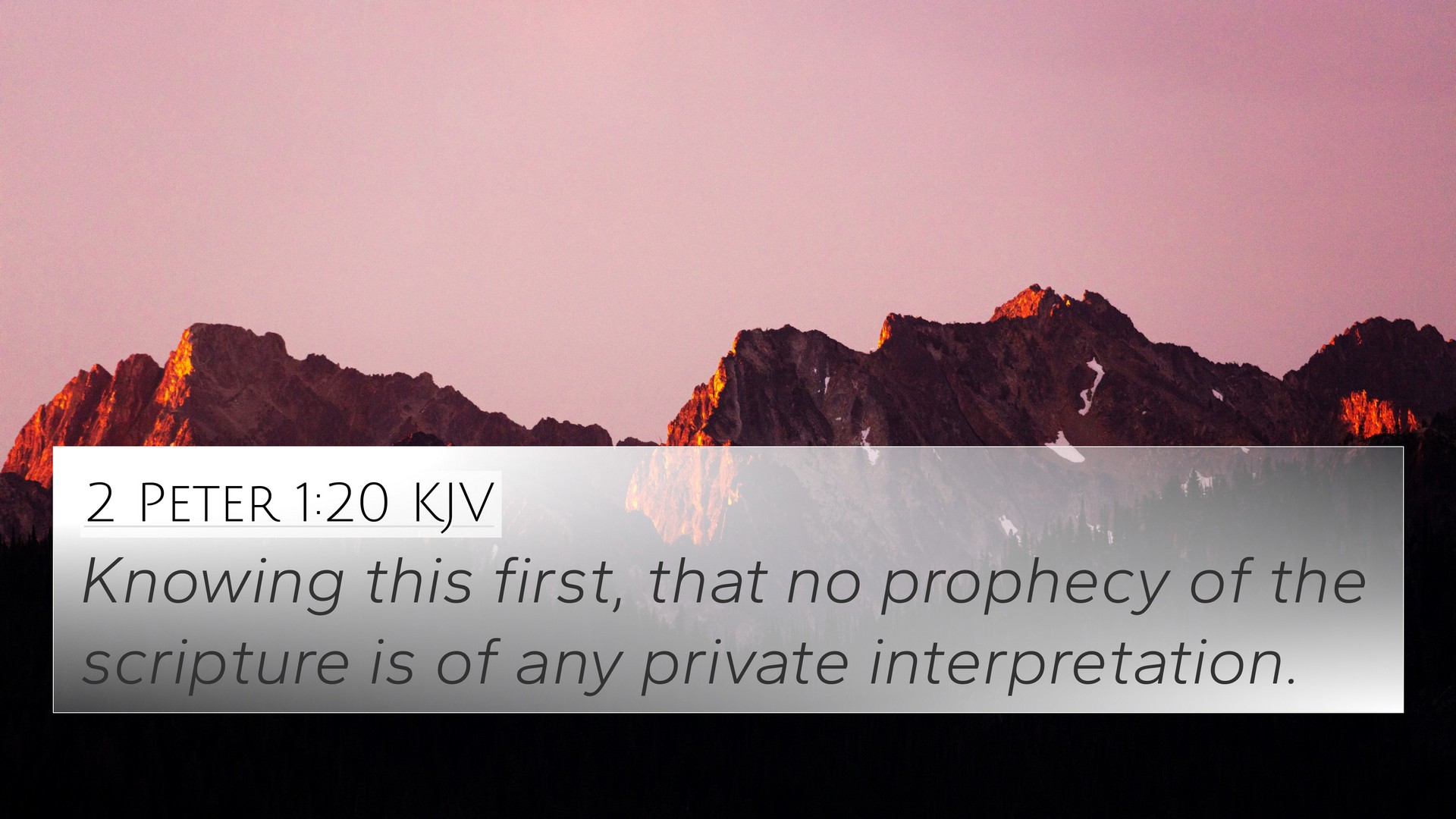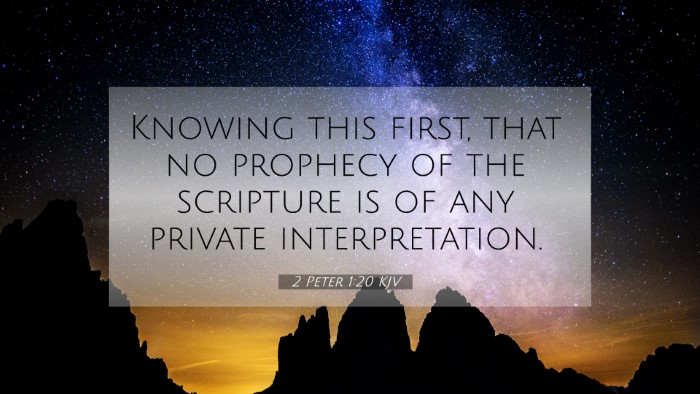Old Testament
Genesis Exodus Leviticus Numbers Deuteronomy Joshua Judges Ruth 1 Samuel 2 Samuel 1 Kings 2 Kings 1 Chronicles 2 Chronicles Ezra Nehemiah Esther Job Psalms Proverbs Ecclesiastes Song of Solomon Isaiah Jeremiah Lamentations Ezekiel Daniel Hosea Joel Amos Obadiah Jonah Micah Nahum Habakkuk Zephaniah Haggai Zechariah Malachi2 Peter 1:20 Similar Verses
2 Peter 1:20 Cross References
Knowing this first, that no prophecy of the scripture is of any private interpretation.
Uncover the Rich Themes and Topics of This Bible Verse
Listed below are the Bible themes associated with 2 Peter 1:20. We invite you to explore each theme to gain deeper insights into the Scriptures.
2 Peter 1:20 Cross Reference Verses
This section features a detailed cross-reference designed to enrich your understanding of the Scriptures. Below, you will find carefully selected verses that echo the themes and teachings related to 2 Peter 1:20 KJV. Click on any image to explore detailed analyses of related Bible verses and uncover deeper theological insights.

2 Peter 3:3 (KJV) »
Knowing this first, that there shall come in the last days scoffers, walking after their own lusts,

Romans 12:6 (KJV) »
Having then gifts differing according to the grace that is given to us, whether prophecy, let us prophesy according to the proportion of faith;

Romans 13:11 (KJV) »
And that, knowing the time, that now it is high time to awake out of sleep: for now is our salvation nearer than when we believed.

Romans 6:6 (KJV) »
Knowing this, that our old man is crucified with him, that the body of sin might be destroyed, that henceforth we should not serve sin.

1 Timothy 1:9 (KJV) »
Knowing this, that the law is not made for a righteous man, but for the lawless and disobedient, for the ungodly and for sinners, for unholy and profane, for murderers of fathers and murderers of mothers, for manslayers,
2 Peter 1:20 Verse Analysis and Similar Verses
Understanding 2 Peter 1:20
Verse: "Knowing this first, that no prophecy of the scripture is of any private interpretation." (2 Peter 1:20, KJV)
Overview
This verse emphasizes the collective nature of Scripture and the importance of understanding prophecies within the context of the entire biblical narrative. The Apostle Peter warns against individual interpretations that deviate from the established truth found in the Scriptures.
Commentary Insights
Matthew Henry: Henry asserts that Peter’s declaration serves as a safeguard against misinterpretation. He emphasizes that prophecies were not birthed out of human will, but were divinely inspired, highlighting the importance of the Holy Spirit in guiding the authors of Scripture. According to Henry, this implies that readers should seek external confirmation from the entirety of Scripture rather than relying solely on personal insight.
Albert Barnes: Barnes warns that the phrase "private interpretation" refers to personal or isolated conclusions regarding Scripture. He argues that interpretations must take into account the broader teaching of the Word. Barnes emphasizes that understanding biblical prophecies involves recognizing their fulfillment and relevance in the broader context, further educating the reader on the value of theological study and cross-referencing other scriptures.
Adam Clarke: Clarke expands on the idea by noting that the prophetic word is part of a larger communal and historical narrative. He points out that true interpretation arises from the alignment of various scriptural texts, encouraging readers to utilize a systematic approach to scriptural analysis. Clarke’s commentary reinforces the notion of interconnectedness within biblical texts, advocating for thorough examination and cross-referencing against other verses for comprehensive understanding.
Thematic Connections
This verse connects with several key themes in Scripture, notably:
- The Role of the Holy Spirit: Understanding the divine inspiration of prophecy (John 16:13).
- The Community of Believers: The importance of collective understanding in faith (Acts 15:28).
- God’s Sovereignty in Prophecy: Fulfillment of God’s word in history (Isaiah 55:11).
- The Unity of Scripture: Consistent themes and truths across the entire Bible (Psalm 119:160).
- The Danger of False Teachings: Warnings against twisting Scripture for personal gain (2 Peter 3:16).
- Interpretive Practices: Encouragement of sound doctrine and study methods (2 Timothy 2:15).
- Tradition and Truth: Maintaining fidelity to apostolic teachings (1 Corinthians 11:2).
Bible Verse Cross-References
To further understand 2 Peter 1:20, consider these cross-references:
- 2 Timothy 3:16-17: "All scripture is given by inspiration of God..." - underscores the divine origin of Scripture.
- 1 Peter 1:20: "He indeed was foreordained before the foundation of the world..." - speaks to the prophetic nature of Christ.
- Acts 3:21: "Whom the heaven must receive until the times of restitution..." - links prophecy with the fulfillment of God’s plan.
- Hebrews 1:1-2: "God, who at various times and in various ways spoke in time past to the fathers by the prophets..." - highlights the continuity of prophecy.
- Revelation 19:10: "For the testimony of Jesus is the spirit of prophecy." - emphasizes Christ at the center of all prophecies.
- Matthew 5:18: "For verily I say unto you, till heaven and earth pass, one jot or one tittle shall in no wise pass from the law..." - the permanence and truth of God’s Word.
- Luke 24:27: "And beginning at Moses and all the prophets, he expounded unto them in all the scriptures..." - connects the Old Testament teachings to the New Testament understanding.
Conclusion
In summary, 2 Peter 1:20 invites believers to approach Scripture with a humble reliance on the Holy Spirit, recognizing the community aspect of interpretation, and understanding that prophecy is not meant for personal gain or private interpretation. Instead, it fosters a collective understanding grounded in the whole of biblical teaching.
Additional Resources for Cross-Referencing
- Tools for Bible Cross-Referencing
- Bible Concordance
- Bible Cross-Reference Guide
- Cross-Reference Bible Study Methods
- Identifying Connections Between Old and New Testament
- Comparative Study of Pauline Epistles



